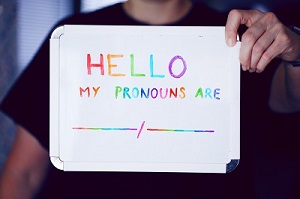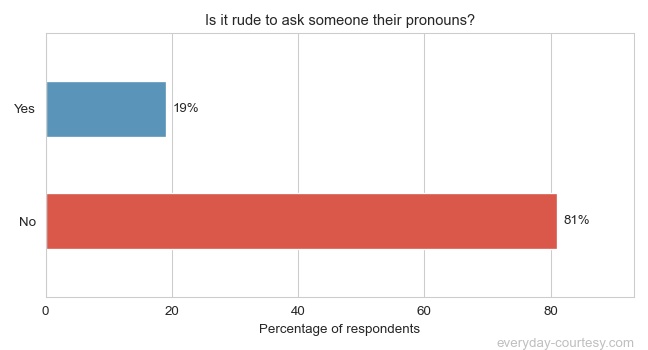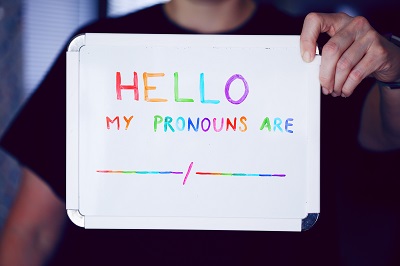Most Millenials first learned about the concept of gender pronouns when in college. It was an exciting concept that we had never really thought about before. Things have changed now. There has been a massive social transformation, and gender-neutral etiquette is now a part of elementary school education.

The idea that someone’s gender may not match their biological sex or that someone might be gender fluid is an exciting idea. The more you think about it, the more you realize how important it is to have this conversation with people.
Our Survey
In December 2021, we asked 103 people in the U.S. whether they thought it was rude to ask someone about their pronouns. Only 19% of respondents thought it was rude, and the remaining 81% thought it was okay to ask someone for their pronouns.

In most cases, it is not rude to ask someone what pronoun someone prefers, but if you’re at work and you’re not sure if it’s appropriate to ask, you may have to consider other ways to show respect. [1] For example, if their name doesn’t match their pronoun or name tag, you could always use their full name in your conversation.
When it comes to friends, family, and acquaintances, there’s no need to make a big deal about asking someone their pronouns. If you’re having a conversation with them and feel they are being respectful and considerate of you, it might be okay to ask them what pronouns they prefer. If not, then just keep it simple. You can always use their name in place of a pronoun or refer to them as “they.”
If you’re a manager or supervisor in the workplace, you should bring this topic up in your diversity training. This could help identify transgender or gender-fluid people who might need support within your company. It also helps show that your company is committed to diversity and inclusion.
When working with people from other countries where gender pronouns are not considered necessary, let them know that in the United States, we consider this very important in our daily conversations with each other.
Remember, everyone has a right to their identity. Respect that identity by using the proper pronouns for someone.
When addressing groups in English, “you guys” is often used due to the lack of a second-person plural pronoun. We’ve taken a closer look at how people feel about the term “you guys” in the survey linked here.
Pronouns have a great meaning
Gender pronouns are words that we use to refer to someone’s gender. Often, people use “he” and “she” as gender pronouns. There are also gender-neutral pronouns, such as “they,” “ze,” and “xie.” Data by Pew Research shows that every five people know someone who doesn’t identify as he or she. [2]
It’s essential to use the correct pronoun for a person. Always try to ask them what their pronouns are and use them when talking about that person. If someone asks you to use a different pronoun, it’s okay to use it.
For example, if someone asks you to call them by their middle name instead of their first name, it is okay to do that. It’s always okay for people to change their name or pronoun if they want!
It’s crucial to realize that some people can feel uncomfortable coming out as trans or gender or non-conforming. You don’t have to out them unless they want you to!
Asking someone about their gender identity can be like asking someone about their race or religion; it’s a personal question that might feel uncomfortable at first.
Just remember: Asking this question doesn’t mean that you’re not accepting trans and gender non-conforming people. It just means that you’re curious!
In a study of more than 3,000 Swedes, scientists investigated how gender-neutral pronouns influenced their viewpoints. [3]
In 2015, the country adopted the term “hen” instead of the “hon” and “han” words that previously meant “she” and “he.”. Results showed that gender-neutral pronoun improves feelings towards LGBT people. There is evidence that the word hen helps people become aware of other genders and counter mental biases that favor men.
What To Do If You Accidentally Use The Wrong Pronoun
Don’t panic if you’ve already said something and then realize that someone is a male-to-female transgender person. You can fix the mistake quickly.
You could say:
“Oh, sorry, I know we just met, but I’m terrible with names and gender pronouns. What would you prefer I call you?”
Or you could say something similar in a different way. If you’re not sure what to say or how to handle it, do your best to apologize for your mistake and move on.
Do it one on one
If you want to ask someone about their pronouns, and you’re in a group setting, try to, at the very least, have some private conversation with them, even if that means leaving the room with them for a moment or finding an excuse to do so.
Transgender people are often unaccepted in society for who they truly are – being asked about your pronouns has included being a part of that experience. Some transgender people even feel scared into not coming out because the world can be cruel in those instances.
Stick with “them” if you are not sure
Asking for someone’s preferred pronouns can not only be perceived as a simple sign of respect, but the pronoun “they” is an excellent option to use if you are unsure. For example, the other party might have had a gender change or may prefer one term over another or be non-binary and wish to avoid using plural pronouns (they/them) altogether to feel even more comfortable in their skin.
Some trans and non-binary people tend to find it quite awkward when others don’t ask for their pronoun of choice. Usually, it’s challenging to get used to calling someone words they aren’t entirely comfortable with themselves, so why should we do our loved ones any different?
Don’t assume
When you’re not a part of the LGBT community, it’s imperative to be aware of how you speak and conduct yourself not to make others uncomfortable. There are gender-neutral pronouns like “they/them/their” that allow people to identify themselves how they choose.
It is essential to ask because not everyone identifies as male or female.
LGBT community best practices call for asking what someone’s preferred pronoun is whenever possible to keep them comfortable while interacting with others. You’d probably get a positive response if you asked upfront.
After all, there’s nothing wrong with asking a question before guessing their gender because it could make others uncomfortable trying to classify someone into one box when really, the person may have chosen not to identify with any gender at all!
Do it with respect
It’s important to respect everyone’s pronouns. Asking about someone’s preferred pronouns shows how much you care and helps communicate clearly with them. Though it may seem awkward, it is unnecessary to feel embarrassed that this subject is new to you.
Learning something new shouldn’t be taken as either positive or negative – learning is fun if you’re open to it!
Sources:
[1]: https://www.ncbi.nlm.nih.gov/pmc/articles/PMC7766835/
[2]: https://www.pewresearch.org/social-trends/2019/01/17/generation-z...
[3]: https://www.pnas.org/content/116/34/16781

Matt Vargas is an author and public speaking coach with a degree in sociology and more than ten years of practical experience. Matt is responsible for the empirical surveys at everyday-courtesy.com, is a passionate recreational musician, and blogs here about his experiences in the field of interpersonal communication.

